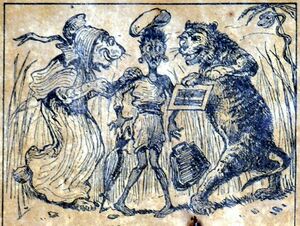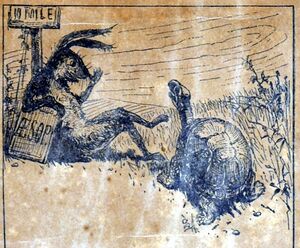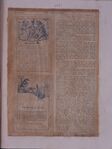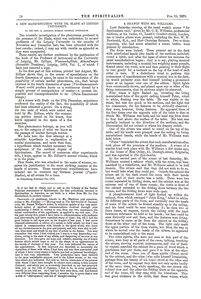The Prudent Tiger

...
The Hare and the Tortoise

...
The Triple Soul
Many years ago I bad the notion that Spiritualism was going to explain mythology, and launched on my long, long voyage of discovery. I collected and correlated the myths of the world, and mastered the ancient system of symbolism, including the reading of the hieroglyphs. My results are not yet ready for publishing, although I have them well in hand. I would say, however, that although Spiritualism, as we understand it, may have been known to the ancients, it does not enter into the origins of the myths, which are solely physiological and astronomical.
I have not seen Madame Blavatsky’s book, but the discussion raised by Colonel Olcott’s letter has induced me to send you the enclosed extract from my forthcoming work, as it bears on the question of a triple soul:—
“The word myth is assumed to mean things fabulous in the past, and false in the present. On the contrary, it is the Egyptian word Mat, which means the hardest substance of Truth. Mat the just and true, proof, appointed, witness, proved, fixed. Mat is the egg of Ptah, the name of his kingdom, as father of beginnings, and former of the egg, or circle. Mat is foundation, to establish, fix, sole of the foot, granite, the stalk of a plant; all that is hard and firm, and able to bear, is Mat. Mat is the mother, and the cabin or ark of the waters that bore the child. Mata is backbone. Mat is everywhere the true substantial basis, and the science of Mat is mythology.
The claim is absolutely true. The myths are founded on facts observed of old, and verifiable for ever. And here is the distinction to be drawn between the true myth and the false; the true is verifiable by existing facts; the false is not—it is but an inference, an assertion.
“Much of the Oriental Theosophy and philosophy, as well as the Christian theology, belongs to the false myth, and is non-verifiable; it is the shadow which cannot be grasped. The true myth was the substance that alone can account for the shadow, and vain is the endeavour to do without the substance. For example, we take one form of the Triad. According to fact and the primordial physiologisers, man is formed of two principles, the life-giving essence and the blood-substance. These supplied the soul and flesh, and from these man was held to be a dual being. The ma (or mai) is the male element, that which had and gave stability. The ma. t. (the t. is feminine terminal) is the mother substance, the original of matter, which makes mater and matter identical. Whence mat, the made or created. But the true spirit of man (homo) as the man (vir) does not enter the male child till the age of puberty, dependent on a well-known physical fact. Here was a revelation indeed, always verifiable. There are therefore three factors of the human being—the procreative spirit, the menstrual substance, and the very soul and self or virility of manhood. This is the origin and sole foundation of the triple soul of the rabbinical Ibbur, or mystery of the conjoining of souls. The Rabbins say there are in man three forms of soul, known as the Nephesh, Ruach, and Neshma. Nephesh and Neshma are used in the genesis of man (Gen. ii. 7). The Neshma is rendered the breath of life, that which was breathed, or inspired. This is the true breath. Nash (Eg.), to winnow, illustrates the breathing. Nashma (Heb.), is a blast. Ma (Eg.), is true. The Neshma was the life-giving substance, the soul or breath of being. For example, Ba (Eg.), is the soul as breath, and Ba. t., to inspire the soul, is the name of the Father as the Breather. The Nephesh, called the life, is the life of the breath, as the Neshma is the breath of the life. The blood was the life as Mother Source, the life of all flesh. The Neshma represented the Creative Cause, the Nephesh the creatorix, however muddled this may be in translation. These are two of the alleged souls. The third is the Ruach, the Divine Spirit designated the Spirit of God, the Spirit of the Lord. It was the Ruach of God that moved to and for in the garden in the breath of the day, as the true reading is; and this realises the Creative Father as the’ breather. The Ruach was at first the Spirit, the courage or potency of a man. (Josh. ii. 11): Our hearts did melt, neither did the Ruach remain in any man. The Ruach is here the third or potential <... continues on page 4-216 >
Editor's notes
- ↑ The Prudent Tiger by unknown author, Spiritualist, The, 15 February, 1878, p.79
- ↑ The Prudent Tiger by unknown author
- ↑ The Hare and the Tortoise by unknown author
- ↑ The Hare and the Tortoise by unknown author
- ↑ The Triple Soul by Massey, Gerald, London Spiritualist, No. 286, February 15, 1878, pp. 79-80
Sources
-
London Spiritualist, No. 286, February 15, 1878, pp. 79-80

